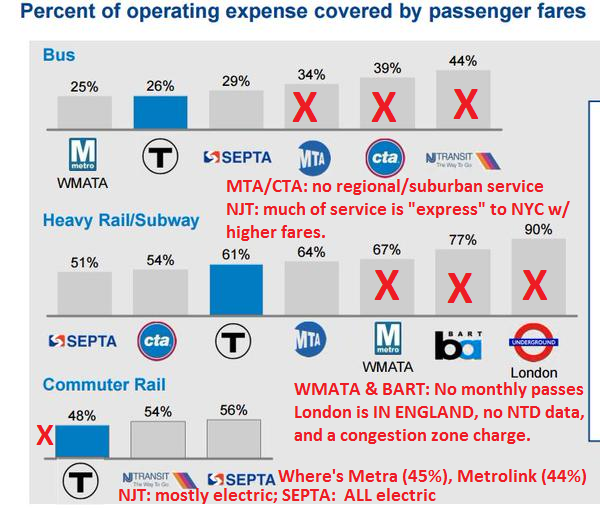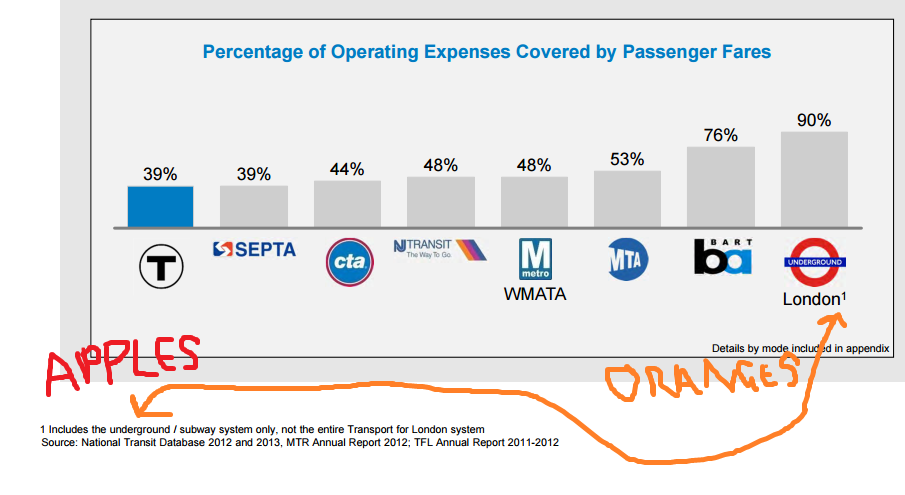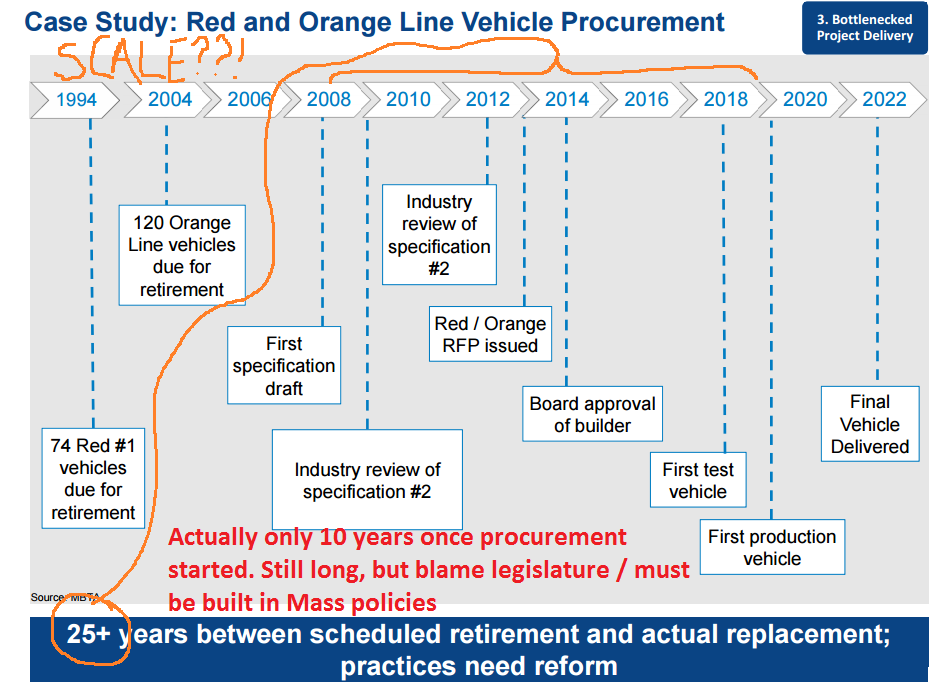I dont know, people... I have to say Im disappointed at all this kicking and screaming... there is a lot of reasonable stuff here in
the report.
On p 16, they propose that the state officially shoulders the legacy and Big Dig debts
Perhaps someone can explain p 17 to me, because they are reporting that every year the MBTA spends roughly half of what it plans to spend each year in capital. If this is true in any way, it's embarassing.
p 17 - why in the world the T doesnt have a decent database of repairs is beyond me (oh, they dont have enough money to record this stuff? great excuse!)
p 18: states exactly what the T ought to be doing:
▪ For FY2016, the MBTA should:
– Prepare an assessment of its most urgent capital and rolling stock needs.
– Identify clear funding needs.
– Spend its entire FY16 capital allotment.
▪ The MBTA should also prepare 5- and 20-year capital plans, laying out a phased
program for the complete restoration of the physical assets of the MBTA, a plan to address
the failings within the existing capital program, and clear recommendations for funding
needs.
– Based on the 5- and 20-year capital plans, the Legislature should create a new, protected
capital fund dedicated to system rehabilitation and modernization.
– This will require a Legislative commitment of new capital funding for the MBTA.
Page 19, all excellent ideas that unions and politically connected people of all kinds will immediately oppose:
▪ The Legislature should permit the MBTA to use project delivery methods used
by other state agencies.
– The MBTA should be permitted to make use of the Design-Build procurement method to
reduce project timelines and increase efficiency.
– The MBTA should be permitted to make use of the Construction Management at Risk
procurement method to better manage costs.
– The MBTA needs an exemption to privatization and contracting restrictions to make an
impact in the severe backlog of projects.
▪ The MBTA should reduce barriers to public-private partnerships and pursue
them to the greatest extent possible and prudent.
– For example, the MBTA should be permitted to seek and consider partnerships that
would allow them to address long term-costs associated with track and rolling stock. An
example would include a re-structuring of the bus network to allow greater reliance on
lower-costs vans, jitneys, and flexible pricing.
p 27 is pretty embarassing... as in my last post, Feb 2015 FMLA - for MEDICAL absence, not snow issues - 2,389 vs Feb 2014 842.
p 28
MassDOT and the MBTA lack a rigorous, long-range system expansion strategy based on a
clear-eyed understanding of the physical and financial capacity of the MBTA and the
regional transit needs of the future.
YESSS a logical mechanism for determining the NEEDS of transit rather than what looks good on a map
It really doesnt even seem that people have even read this document - for instance, at the end it recommends that the governor, among the recommendations:
▪ Prioritize and understand immediate capital needs, the Governor directs the Secretary of Transportation and Chief Administrator to assess MBTA’s most urgent capital and rolling stock needs for the next 5 years, recommend priorities, and submit a procurement and implementation plan.
▪ Capture future revenue opportunities, the Governor directs the Secretary and Chief Administrator to develop a pro-active plan to significantly increase its own-source revenue through fares, advertising, concessions, parking, and real estate, as well as through grants and federal programs2.
▪ Focus on immediate and short-term capital needs, or the State of Good Repair, the Governor directs MassDOT and the MBTA to impose a moratorium on all construction spending for system expansion, except for federally funded projects3.
▪ Tackle procurement inefficiencies and cultivate expertise, the Governor directs the Secretary to centralize agency procurement and contracting under a new professional office for both the MBTA and MassDOT.
Rec's for the legislature include AMENDING EXISTING LAW TO:
Amend existing law to:
▪ Permit the use of project delivery methods used by other state agencies.
▪ Free the MBTA from the constraints of the Pacheco Law, and other limits placed on its use of modern procurement, where beneficial and cost-effective.
▪ Review the process of collective bargaining and consider limiting provisions (i.e. eliminate evergreen clauses, limit scope of issues subject to binding
arbitration, and require board approval of agreements), as needed to establish cost-effective operations and to better promote a collaborative relationship between management and labor.
▪ Reconstitute the MassDOT Board to make it more effective and representative. Reconstitution should include: increasing the number of members; changing the terms so that the majority of members serve coterminus with the Governor by whom they are appointed; appointing the Secretary of Transportation as the Chair. Further changes to the structure of the MassDOT Board should be informed by the experience of the FMCB period2.
and
Longer term:
▪ Create a new, protected capital fund dedicated to system rehabilitation and
modernization based on the 5- and 20-year capital plans.
this report sounds pretty reasonable to me. the agency is clearly utterly rotten to the core and NO the sole excuse is not lack of funding, which does not explain high absentee rates, backward records keeping, and total lack of clear vision. fix the system, figure what the immediate needs are, and fix those, while developing a new and well-reasoned analysis of where the next expansion ought to be.




